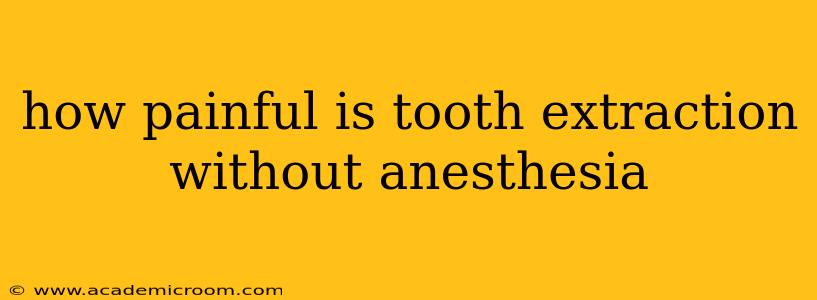How Painful Is Tooth Extraction Without Anesthesia?
Tooth extraction without anesthesia is excruciatingly painful for the vast majority of people. The level of pain experienced can vary depending on several factors, including the complexity of the extraction, the individual's pain tolerance, and the specific tooth being removed. However, it's universally considered one of the most painful procedures imaginable without the use of pain relief.
Let's delve deeper into the factors that influence the pain experienced:
What are the factors that influence the pain of a tooth extraction without anesthesia?
Several factors contribute to the intensity of pain during a tooth extraction without anesthesia:
-
The Complexity of the Extraction: A simple extraction, where the tooth is visible and easily removed, will still be incredibly painful. However, a complex extraction (impacted wisdom tooth, for example), requiring significant bone removal or cutting of the gums, would be exponentially more agonizing. The force required to remove the tooth from its socket and the manipulation of surrounding tissues significantly increases pain levels.
-
Individual Pain Tolerance: Each person experiences pain differently. While some might have a higher tolerance for pain, the intense pressure, tearing of tissues, and bone manipulation involved in extraction make it overwhelmingly painful for virtually everyone. Even those with high pain tolerance will likely find this unbearable.
-
The Specific Tooth: The size, root structure, and position of the tooth all play a role. Larger teeth with multiple roots or those situated in a difficult-to-access location will generally be more challenging and painful to extract.
-
Infection or Inflammation: If the tooth is already infected or inflamed, the pain will be considerably amplified. The infection itself will cause significant discomfort, and the extraction process will further irritate the inflamed tissues.
What does the pain feel like?
Describing the pain of a tooth extraction without anesthesia is difficult, as it's a unique and intense experience. It's a combination of several sensations:
-
Sharp, intense pain: This is the immediate sensation as the dentist or surgeon begins to work on the tooth. The pressure and pulling on ligaments and surrounding tissues will be excruciating.
-
Deep, throbbing pain: Once the tooth is removed, the socket will be exposed and very sensitive. This leads to deep, throbbing pain that can last for several hours or even days.
-
Pressure and tearing pain: The process of removing the tooth involves significant pressure and the tearing of gum tissue and possibly bone. This results in acute, intense pain.
-
Post-operative pain: Even after the procedure is complete, significant discomfort and pain are expected. Bleeding and swelling can add to the overall pain experience.
Are there any ways to minimize the pain without anesthesia?
While completely eliminating the pain is impossible without anesthesia or other pain relief methods, some things might slightly reduce the intensity:
-
Taking over-the-counter pain relievers before the procedure: Although it won’t eliminate the pain, taking ibuprofen or acetaminophen before the procedure might slightly lessen the acute pain during the procedure. However, this is not a substitute for anesthesia and will only offer marginal pain relief.
-
Deep breathing and relaxation techniques: These techniques can help manage the psychological aspect of pain and may offer minor comfort.
Why is anesthesia always recommended for tooth extractions?
Anesthesia is essential for tooth extractions because it eliminates the excruciating pain associated with the procedure, ensuring patient comfort and minimizing the trauma. Without anesthesia, the intense pain can lead to increased stress, anxiety, and potential complications. Furthermore, the patient’s movement due to pain can endanger both the patient and the dental professional. Therefore, anesthesia is not merely a matter of comfort but also a crucial element of safety.
In conclusion, undergoing a tooth extraction without anesthesia is an incredibly painful experience, and it's highly discouraged. The use of appropriate anesthesia is a standard of care and ensures a much safer and less traumatic procedure. Always discuss any concerns about anesthesia with your dentist or oral surgeon.
